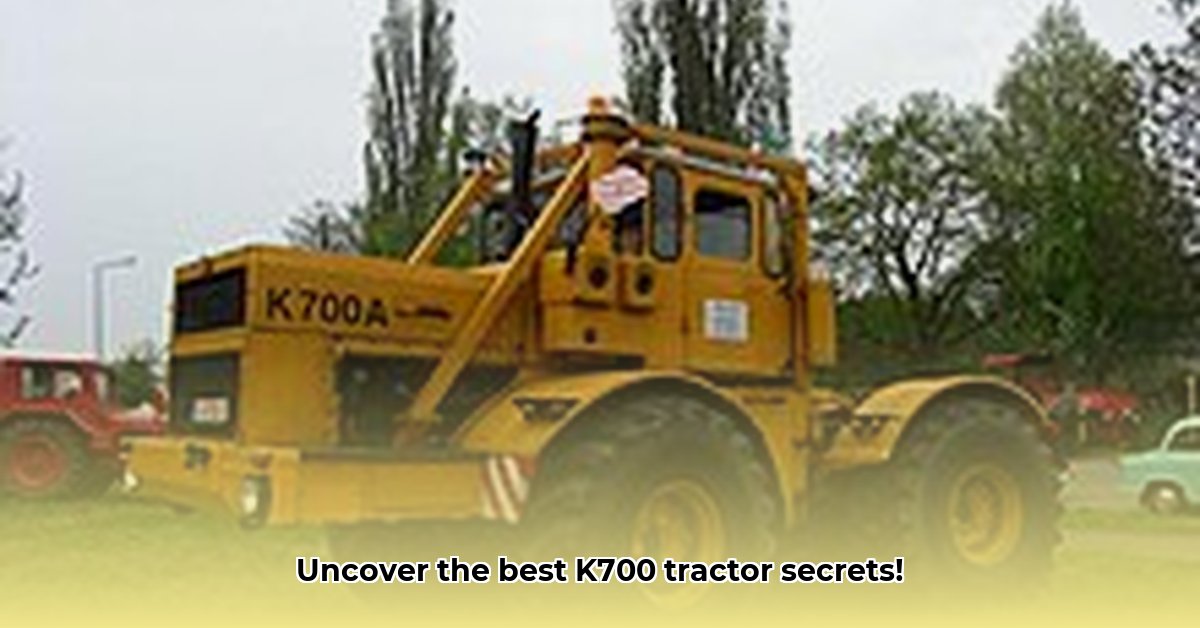
K700 Tractor: Your Guide to a Smart Purchase
Buying a Kirovets K700 tractor is a significant investment. This guide helps you navigate the complexities of the market, understand the differences between models (like the K744), and make an informed decision whether buying new or used. We’ll cover pricing, maintenance, potential risks, and legal considerations to help you find the perfect machine for your needs. For more information on tractor pricing, check out this helpful resource: tractor pricing guide.
Kirovets K700 and K744 Tractors: A Detailed Comparison
The K700 and its successor, the K744, are heavy-duty, four-wheel-drive tractors renowned for their reliability and power. They are ideal for large-scale farming and demanding agricultural tasks. However, understanding the distinctions between them—and the implications for price and maintenance—is crucial before purchasing. The K744 often boasts improved fuel efficiency, enhanced controls, and more advanced features compared to the K700, but this generally comes at a higher price. Which model aligns best with your needs and budget?
New vs. Used K700 Tractors: Price and Condition Considerations
The price of a K700 tractor varies significantly depending on several factors. A used tractor typically costs considerably less than a new one, making it an attractive option for budget-conscious buyers. However, it's crucial to remember the potential for higher maintenance costs and repairs. Newer models, while more expensive upfront, often offer better fuel efficiency, lower long-term running costs, and advanced features. The optimal choice for your farm will depend on your specific needs and financial situation. A thorough pre-purchase inspection by a qualified mechanic is highly recommended for used tractors. Isn't it worth the investment to minimize potential future headaches?
Essential Questions Before Purchasing a K700 Tractor
Before beginning your search, ask yourself these crucial questions:
- Budget: Establish a realistic budget, considering not only the purchase price but also potential repair and maintenance costs. Used tractors might seem cheaper upfront, but hidden problems can quickly erase those savings.
- Specific Needs: Assess the size of your farm, the types of tasks the tractor will perform, and whether advanced features are necessary for your operations. A smaller farm might not require the additional power or features of a higher-end model.
- Maintenance Plan: Plan for regular maintenance. Will you perform basic upkeep yourself, or will you hire a mechanic? Account for these costs in your budget.
- Parts Availability: Identify reliable parts suppliers and mechanics familiar with K700 tractors in your area. This step will prevent future delays and complications.
Mitigating the Risks of Buying a Used K700 Tractor
Buying a used tractor presents risks. However, a proactive approach can effectively mitigate these potential problems.
| Factor | Risk Level | Mitigation Strategy |
|---|---|---|
| Age and Condition | High | Comprehensive pre-purchase inspection by a qualified mechanic. |
| Parts Availability | Medium | Research and establish relationships with reliable parts suppliers. |
| Maintenance Costs | Medium | Develop a detailed maintenance schedule and budget for repairs. |
| Import/Export Costs & Taxes | Medium | If importing, account for all associated costs (shipping, duties). |
Legal Compliance: Navigating Regulations
Before purchasing, ensure the tractor complies with all local regulations concerning emissions standards and safety requirements. Compliance failures can result in significant fines or legal issues. Local authorities will be able to outline pertinent rules specific to your location.
Assessing Operational Costs: A Comprehensive Approach
The true cost of a K700 extends beyond the initial purchase price. Consider these operational expenses:
- Maintenance: Older models demand more frequent maintenance; budget accordingly.
- Fuel Consumption: K700 tractors consume significant amounts of fuel; factor fuel costs into your projections.
- Insurance: Obtain quotes from multiple insurers to determine coverage costs.
- Repair Costs: This is a substantial unknown; prioritize tractors with thorough service records.
- Transportation: Include transportation fees in your budget if purchasing from a distant location.
"A thorough pre-purchase inspection is critical," advises Dr. Anya Sharma, Agricultural Engineering Professor at Purdue University. "It can prevent costly surprises down the line."
By carefully considering all aspects—from upfront costs to long-term operational expenses—you can make a well-informed decision and secure a reliable tractor for your farm. Remember, a well-maintained K700 can serve as a valuable asset for years to come.